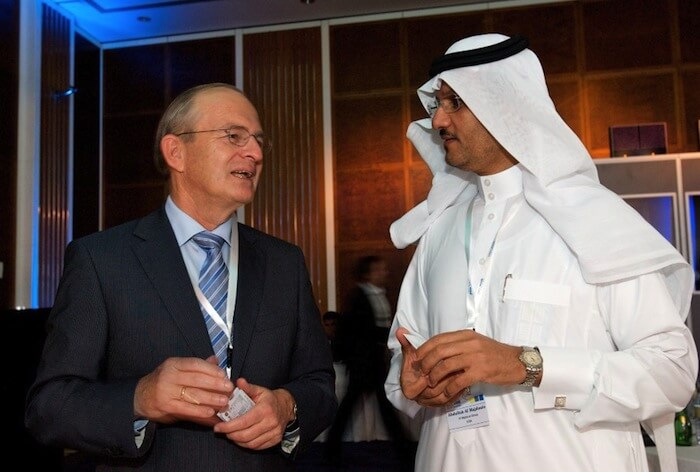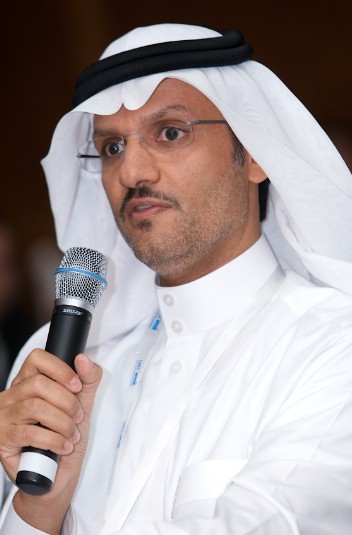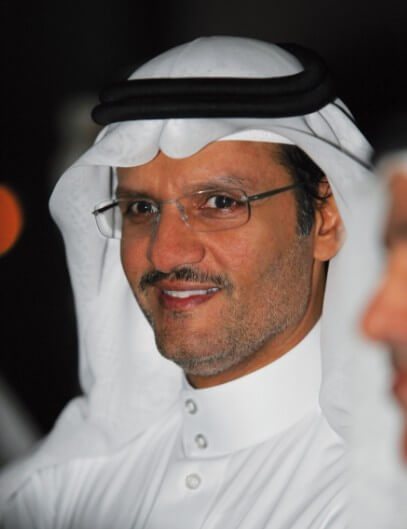In 1965, Shaikh Ali Ibrahim Almajdouie set the corner stones of what was to turn into the Saudi family conglomerate, Almajdouie Trading Establishment. Initially a land transportation company, the family business has since widely diversified. Today, Almajdouie Trading Establishment is a regional leader in the field of supply chain and project management, and in providing services such as logistics and distribution, transportation, customs clearance, freight forwarding, heavy haul & warehousing. Other operations consist of the distribution of Hyundai Automobiles, activities in the steel industry, and operations in the food industry, real estate, and investment. The group enjoys the backing of over 5’000 motivated employees operating all over the Kingdom of Saudi Arabia and GCC countries. Tharawat magazine speaks to Abdullah Ali Almajdouie, President of the Almajdouie Group, about ‘SPARK’ of innovation, family business constitutions, and the challenges in succession.
Almajdouie Group has enjoyed a greatly successful growth history since its establishment in 1965. Sensibly diversified the group continues its expansion.
How do you foster continuous innovation in the company?
I remember attending a workshop once with our company executives; it was a strategy lecture, and the lecturer threw in words such as ‘creativity’ and ‘innovation’. Of course, I had heard these notions before, but sometimes you need that moment of ‘click’ in your mind where concepts turn into something tangible and things start moving. The lecturer was talking about innovation and ideas programs and how the talent and the brains of your organisation can be explored by compiling the ideas of employees through giving them the right respect and environment to work in. Otherwise you run the risk of your employees closing up and you will never be able to benefit from what they have to offer. From then on we started to setup the program called SPARK. The aim of this program is to find out what employees think could be improved in a specific workplace or the company as a whole. It ceases to be about ownership; ‘this is mine’ and ‘this is yours’ becomes obsolete and there are no taboos. Anyone can freely talk about their job, about their SBU, and about the company and add ideas to improve processes.
Top management level supports these efforts. Without the active involvement of top management this would not be possible; tackling certain issues within the program would never be possible. It is like a long pipeline where a process starts but then can get stuck unless there is a pump machine that gives it a thrust. Top management needs this vision for value creation and to react as drivers of processes. They have to push and they have to keep the ideas flowing in order to keep the SPARK program alive. If you fail to implement at least some of the ideas produced, people will lose their belief in the program. It is important to seize the moment and start a process from the spark of innovation that came directly from your employee’s minds. Since the initiation of SPARK we have developed over 25’000 ideas and the savings so far more than $ 5 million in the span of 7 years . In addition, we have employed the best system software system in the world. This was done in order to make sure there is a proper follow up on all ideas. The ideas are tracked and flagged. If someone from management is late with a follow up, the flag automatically gets forwarded to his boss and the same thing happens if he delays action for more than a certain number of days. It is a dynamic process and people know that it is part of their KPIs. They have to formulate the ideas and pursue the implementation as well; there is a 6% implementation ratio that needs to be maintained. So when there are 100 ideas, we guarantee that more than 6 ideas will be implemented. It is not only about the quantity of course, but mostly about the quality.
So far we have succeeded in maintaining this implementation ratio. Our people have become very educated in the program and are delivering speeches and presentations across the GCC. Just recently a few of them went to Dubai where they presented our program to the audience at a conference on innovation. In May 2010, we won the first prize in Saudi Arabia as a creative organization in a contest called “EBTIKAR”.
How long did it take to implement the SPARK system?
With regards to corporate culture, the implementation took some time; maybe two or three years. As a system it was quickly implemented within a month or two only. But when we speak about the culture then that is a different topic. Imagine the challenge in making all 5’000 employees share ideas. Contrarily to a anonymous suggestion box, SPARK has more of a focus groups approach. Therefore, it is more intense. Suggestion boxes somehow lack human & social touch. There is no direct appreciation for an employee from a box. It is sometimes important to just say ‘That is great!’ when someone suggests improvement or innovation. We stopped the suggestion boxes and now we just relate to the focus groups, and the work groups. They all have to come together and share their ideas with others.

Today, you have over 5,000 employees in the group.
What is the degree of family participation and how has it developed over the years?
We are five active family members involved right now; our father, myself, and my three younger brothers. These are the active family members in the business; first and second generation collaborating. Actually, I was the first of the sons to join. I started in ’86. My next brother came on board only nine years later. In the beginning, when I joined, the concept of family business was not on my mind. I was still new at everything and I had not thought much of issues such as succession and governance. But as we moved along, and as my brothers were approaching joining the company, I started reading about family businesses and what makes them succeed or fail. We had to live up and understand why others made if for 50 or 100 years, and why others did not make it past the second generation. I said to myself that I had to learn more about it all. I joined the IMD Business School program in 1996. We have a saying you see, which states that ‘ignorance is the enemy’. It is like a big black box. Once, however, you get over the ignorance stage and you are aware of your context, things fall into place and once you switch the lights on, you see what the obstacles and challenges are. I started to understand. When my brother started nine years after me, and when later my other two brothers joined, my aim was to create that awareness for them from the very beginning we should all read from the same page. It is a whole attitude that I feel is important and that they should feel has importance for them as individuals in the business. The ambition was that they should know more about family business best practices. My aim was to share the knowledge, and that is what happened; two of my brothers also joined the Tharawat Family Business Forum and attended workshops as well as other family business conferences. Our third generation members are now given training in family business practices, even during their college time. They learn about how to maintain the heritage and successful companies and what is the importance of being together versus splitting up, and also what the challenges of Family Business as a whole. We are consciously instilling this awareness at the earliest stage possible.
You have an early approach to the integration of the younger family business generation. You have had a family business constitution in place for a while.
Do you see a correlation between having a constitution and the structured approach to the integration of young family business members?
The constitution puts things into a proper framework. But it will not create the belief and it will not change the culture. You have to believe in it. You have to agree with it. There has to be consensus. The constitution provides the right legal formalities and framework for everything. It is a clear and well-formulated framework that you put everything into but the belief & values comes first and should already be there. The document comes after the attitude of the family.
What are the fundamental elements that need to be included in a family business constitution in order to make it successful and in order for everyone to consider it as a valid guideline?
Well we have two parts; the hard part and the soft part. The hard part consists of the documents, the legislations, the write-ups, the rules and regulations. Then you have the soft part, which, in my opinion, is more important than the hard part. The soft part displays the values, the respect among the family members, the honesty and dignity. These are as important if not more important than legal formalities. The soft part comes with rules that state that for instance the children should all be treated equally. These visions of transparency come from the family itself. Of course, initially it is the founder who puts these values down. Then the eldest son carries them on and the rest learns how to share them. I could say that we are trying to do as the proper values dictate. Some families miss the point of the value transition. Generational gaps ensue. It is not a gap in thinking, but in values. The children are not strongly connected to their elders. They are away from the business and they are away from the families and so values and the culture transfer becomes very difficult. And yet there is nothing more important than this passing on of ethics from one generation to another.
Each family business will change at least part of its dynamics when new family members come on board. What are the success factors for a smooth transition from one generation to another? Any type of specific approach to the successful integration of the next generation?
The generational shift has to be planned. It is imperative. You cannot have your sons study abroad for years and then just pull them back and tell them to take over the company. There are entirely different passions; they may not have the same cultures and values. Therefore, you have to carefully plan the inception of the next generation into the company. They have to be empowered, and given the tools to try. They have to feel that they are the owners. Sometimes when the elder retires it seems like jumping onto a piece of cake to the next generation. Instead they should feel that they are the owners and carry the responsibility.
I myself came in as the first of the second generation to support my father. There was no structured approach at that time of course. I am the elder one and I had to step in. Fortunately that fact was aligned with what I liked and was passionate about. I liked the business.
The elder generation remembers working in a time when there was no Internet and no cell phones, however, there is a new generation that was born into a different technological age. When you look at your own generation and the incoming generation, what do you think are the major differences between the two? How can these respective characteristics impact the continuity of the family business?
This is a question that tackles cultural differences between generations. This issue not only concerns family businesses, but also normal companies. Each generation has its good and bad aspects. We cannot say that one is better than the other. But I think that the next generation has a lot of strengths. Their minds are more open to the world. They are more globalised than older generation.
When you read historical books you will always find a father complaining about his son or a son feeling misunderstood by his parents. It is the oldest issue in the world and an issue that is always there. It is relative, it is not absolute. I think the younger generation is smart. But they come in like a flood. You have to channel that flood where you want it to go so that it ends up irrigating the right spots of land. Otherwise if you leave it without a proper direction, it ends up destroying everything you have worked for. It is a very powerful new generation. They have the power, they have the money and they have their dreams. It is about channelling their energies.

When you speak about channelling these energies, does the Almajdouie Group have a specific approach for the integration of the next generation? Will there be a significant amount of incoming family business members over the near future?
We have developed a family office that handles all the family affairs and where the boys and girls can raise their issues. This way they do not have to approach the company but can consult a separate unit. Otherwise it gets confusing for the employees. They have the family office, which is intended to take care of all their requests, demands, and inquiries. They have to channel everything through that entity.
In the constitution we stipulate that before family members join the company they have to have a degree from a reputable university. They also have to have a three-year experience in a multinational company before starting with us. They have to try for themselves first but in case they cannot find a job we give them support to find them good companies. There are also summer trainings that are arranged by the family office. Our young family members have to do something during the summers. We have minimum four trainings a year for the ones at university and even the ones attending high school. Four different trainings that encompass time management, planning, and focus on determining future careers. We send a clear message to them that they do not have to be employed by the company; ‘Just pursue what you like and what you love.’. If they would like to be pilots or doctors they should just go ahead.
This is a source of innovation of course, as they will come up with new ideas that can potentially become part of the business. One of my sister’s sons told me the other day ‘Uncle I want to be a doctor’. ‘Go ahead!’ I said ‘You have your company available if you need it and you just pursue what you love.’ They should not have to push themselves hard and force themselves to join. The company will go on and succeed. The more of them come in, the more sophisticated it all has to become. But the more successful they are in their respective fields of their choice the more they support the business from the outside through enhancing the family name. It reaps benefits both ways. I prefer that they go out and pursue their dreams and become successful in whatever they want to be. Especially, if they consider the company as a pass time, and they just do not really feel it. Of course, I hope that some of them see their dreams within the company.
How many 3rd generation family members do you have?
We have about 35 boys and girls. Around eighteen boys; twelve of the them are attending the trainings so far. Two are already working outside. We have also developed a career planning committee. They all have the opportunity to sit with the committee in order for them to find out their areas of interest.
The young generation pursuing their own dreams is also a big source of innovation. Do you have a specific approach for young family business members that show entrepreneurial initiative outside the scope of activities of the family business?
In the constitution we have two types of support for entrepreneurs. We have the venture support where we partner with the young entrepreneur provided that he is well educated and has the right idea. We do the feasibility study for his initiative partner with him. The second approach we have developed for ‘unlucky people’ for instance in their education or ventures so far. We give them support once in their lives. We give them half of the necessary support, whereby there is a ceiling for the amount we provide, and his father supports him with the other half.
The younger generation will be facing quite a different economic landscape than we are today.
Considering the fast changing economic landscape, where do you see the group’s priorities in the next five years?
We have to adapt. It is important that family members should be exposed to the real world arena, not to a closed environment sitting in chalets and offices as if the whole world belonged to them. The real world is so different. You always have to be attentive and open eyed. Attend conferences, attend trainings, mingle with international experts, and see what the trend is. Without that you will think that your company is the whole world. You have to discover that your company is just a small player in the big picture. Another point and possible draw-back is when you have become very emotionally attached to a business. To grow and expand you have to shake the tree. If you shake the tree the bad concepts, ideas, and businesses, will fall off. So sometimes companies are in denial about this but fact is that if the business does not make money it has to go. We have a lot of fragmentations and diversification in the region and people feel proud to say that they have so and so many activities in so and so many industries. But sometimes none of these activities are really good, and it can become very stressful when you exert your efforts into so many fragments and do not really succeed in any of them. It is about staying open minded. And you should not try to carry something you cannot hold. Leave it.
I think the challenges in the near future are not going to become lesser. That is why each and every family should pursue their goals more than ever. It is not like ‘no news is good news’; just because things have gone fine so far that does not mean that they will continue so. Some of the elder generations are being complacent because they have experienced years of success. But you have to continue to touch on taboos. If you do not do that, it will catch up with you eventually.
















